This post contains spoilers for Disney’s movie Encanto.
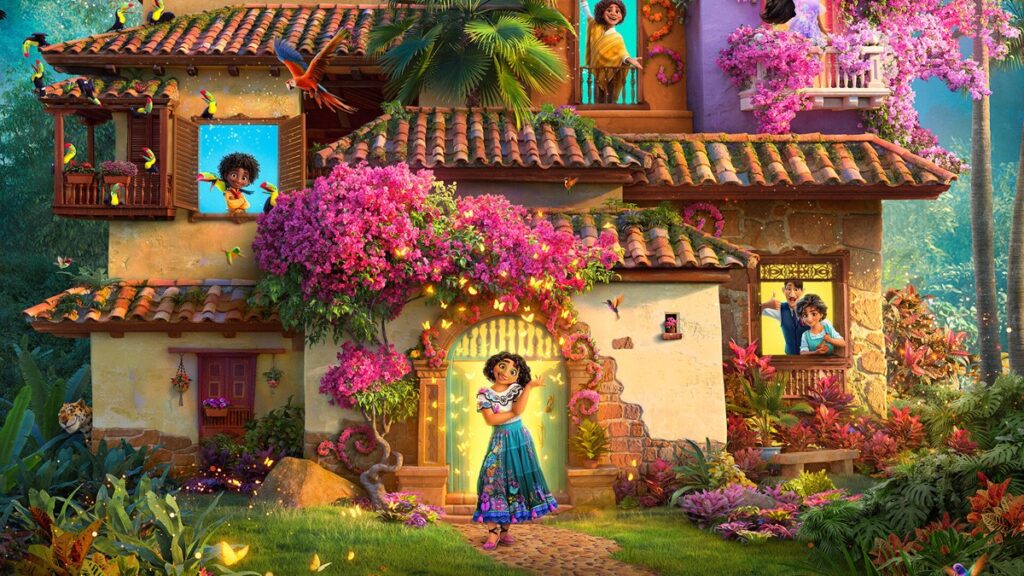
Disney’s Encanto is a colourful story of a Colombian family who realises they must let go of falseness in order to see the truth of love that binds them together. The film begins with the family’s matriarch, Abuela, fleeing her home as a refugee with her husband Pedro and their three babies. Pedro gives his life to save his family and, now alone, Abuela discovers that the candle she carries miraculously becomes a source of magic, refuge, and security. Before her eyes the mountains rise around her and a home is created, her beloved casita. When her three children come of age they receive three special gifts which they use to help the community. The family Madrigal and their casita become the centre of the community. As the family expands, the grandchildren receive their own gifts. All is well and it seems the magic candle and the Madrigal family provide everything the town needs. It reminds me a bit of the island of Motonui in the movie Moana, where the security of the island becomes a kind of false security. The lesson of that film, and this one, is that one has to let go of the false security and false narratives in order to find a healthy and lasting community.
Encanto has four main dichotomic themes, each which holds great wisdom. Let’s examine them.
 Blindness / Seeing
Blindness / Seeing
Mirabel, the main character, one of Abuela’s grandchildren, for some reason never received a magical gift. She doesn’t have super strength like her sister Luisa or shapeshifting ability like her cousin Camilo. As a result, she’s kind of taken a second place in the family. Even Abuela doesn’t really see her as a contributor to the family or community. And then there’s Bruno. Bruno’s gift is prophecy and the family saw him as one who “lost his way”. His truth-telling and visions of the future was misinterpreted by the community, that he was actually causing negative things to happen. Rather, like any prophet, he just spoke the uncomfortable truth and people didn’t like it. He was shunned and left the family, choosing to live within the walls of the house. A prophet is not accepted in his hometown, right?
When Mirabel senses that the magic is dying and cracks begin forming in the casita, she warns the family and Abuela, who denies this, claiming that the magic is strong. No one wants to see their precious gift slipping between their fingers. Like with Bruno’s prophecies, they prefer to stay blind than to see the truth of reality. And while Bruno sees truth with his visions, Mirabel learns to see by asking questions. Through encounters with members of her family she tries to learn about Bruno and a mysterious vision he had. She also discovers her family’s vulnerabilities “under the surface”. They’re not really being their true selves (keep reading).
Bruno’s vision incudes a cracked casita and Mirabel. But it’s not not clear whether the cracks remain and what Mirabel’s role will be in it. Bruno never really left; he remained in the walls of the house. In fact, Mirabel discovers him patching the cracks, trying to hold things together. Bruno, like any prophet, is—in the words of Richard Rohr—on the edge of the inside. Literally. He can’t leave the casita or the family if he wants his prophecy to remain authentic. Bruno and Mirabel work together to keep their family together through seeing, Bruno through his visions and Mirabel through uncovering her family’s true selves. Her seeing is symbolised by her green glasses. It’s no surprise her name begins with mira, which means to see. And, in many ways she holds a mirror up to her relatives. Together they metaphorically heal the family’s and Abuela’s blindness.
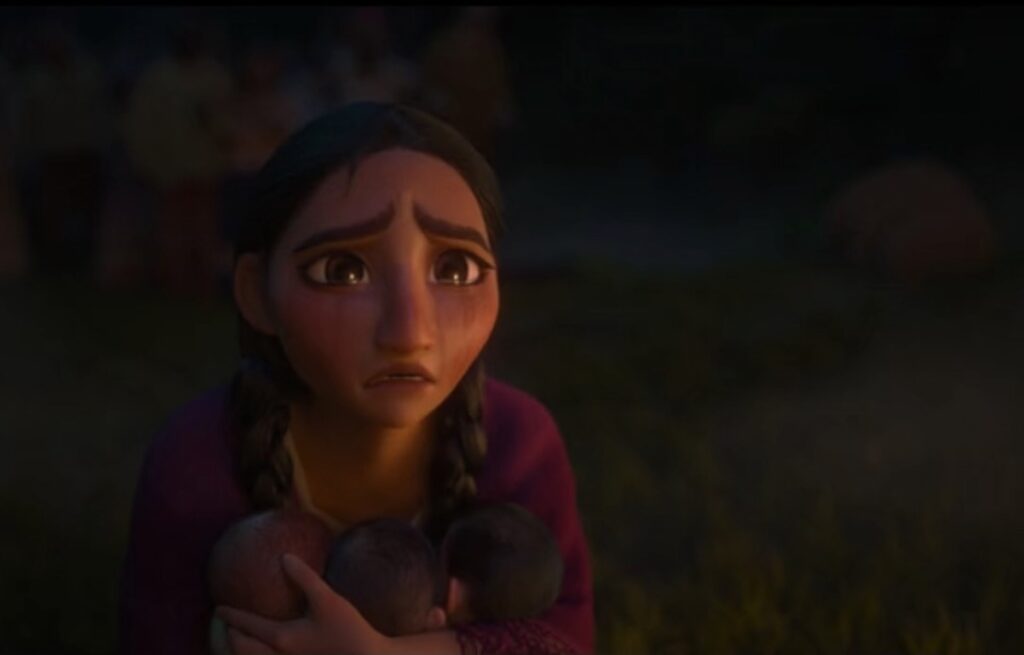
False Self / True Self
The magic of the Madrigal family came from the trauma of Abuela’s flight from violence. The magic candle gave her refuge and security. When cracks start to form in the casita, she asks the family to “work twice as hard” as if the magic will stay with their effort. It raises the question of grace versus works, accepting the blessing of the magic as a gift versus controlling it. It’s understandable that Abuela doesn’t want to lose her home again. The expectations she places on her children are what is called “generational trauma”. She places her own burdens upon them, expecting them to do her healing for her.
Mirabel, meanwhile, is doing her own healing as she listens to her relatives admit that they have been living a false life. Her sister Luisa feels pressured to always (literally) carry the burdens of others using her super strength. She sings, “If I could shake the crushing weight of expectations / Would that free some room up for joy / Or relaxation, or simple pleasure?” When Mirabel convinces Bruno to have another vision he sees Mirabel and her “princess-perfect” sister Isabela embracing, which somehow saves the magic. Mirabel and Isabel detest each other. When Mirabel reluctantly seeks her out for that saving hug, Isabela, whose gift is magically blooming flowers, admits to being stuck in an expectation of perfection. As she shouts angrily she magically creates a cactus, something she’s never done before. It’s something new, something unsymmetrical, yet—she realises—something beautiful. “So much hides behind my smile,” she sings. “What could I do if I just grew what I was feeling in the moment? What could I do if I just knew it didn’t need to be perfect, it just needed to be.” She and Mirabel embrace and the cracks start disappearing and the candle burns brighter. The magic grows by her just being herself.
 Exclusion / Togetherness
Exclusion / Togetherness
Mirabel and Bruno are both “outsiders” from the rest of family, seen as strange and “lost”, blind to the purpose of the family. As we come to see, it’s the other way around. Abuela’s intentions for the Madrigal family are good. When each child comes of age the miracle (the encanto) blesses them with a magical gift, which is used to bless the larger community. Mirabel’s mother, for example, Julieta can heal people with her cooking, a beautiful symbol of the healing power of a meal, especially shared at table. Abuela sees the magic as central to the family. “Think of the family,” she continually tells everyone. But the intention of togetherness and unity ends up excluding, not least of which is Mirabel and Bruno. Each member of the family feels their own isolation and loneliness with the crushing expectations placed on them. Isabela is even arranged to marry a man named Mariano, despite not wanting to, because it’s “best for the family”. Eventually Mirabel lashes out at Abuela, telling her that the cracks in the casita and the family’s dying powers are because of her, that no one will be good enough for her.
It’s clear that Abuela has been clinging to the “blessing” and the false security of it. She has made it an idol.
Death / Resurrection
Abuela had a deep faith in the blessing, which the candle symbolised. We tend to see faith as something we hold onto and grasp. Mature faith is one of letting go, releasing, and being freed. When the magic dies and the casita collapses, cracks extend throughout the town and a mountain splits open. It reminds me of after Jesus’ crucifixion, when the earth quakes and the veil is torn. The facades are broken open. Mirabel escapes through the split of the mountain and goes to the place where the magic began, the place where Abuela’s husband Pedro gave his life for her, the source of the blessing. Abuela finds her and says, “I lost sight of who our miracle was for.” Mirabel’s own eyes are opened to Abuela’s plight, the loss of her beloved, and her hope for her family. “I can finally see,” she says.
The song Dos Oruguitas expresses how renewal and transformation can only happen through letting go, even to grow apart in order to reunite. As the family lost its house and gifts, they found grace at rock bottom. They had to lose what they had in order to see that they were more than their gifts. The word oruguita means caterpillar. Throughout the film we see references to butterflies, alluding to the real transformation that was to take place, not in the house or the candle, but in the hearts of the family. Abuela and Mirabel, who have no magical gifts, restore the family and the magic by being their true selves. And they grew apart so they could grow together again.
As the story concludes the whole town walks in to help rebuild the casita. “Lay down your load. … We have no gifts but we are many, and we’ll do anything for you.” The family and the townspeople rebuild as people who are just themselves, without any particular magical gifts. “The miracle is not some magic that you’ve got. The miracle is you,” Abuela sings. “Dos Oruguitas” and this final song reminds us about the goodness in change, that we can’t just be satisfied with the false security of the islands we build or the stories of perfection we tell ourselves. “The stars don’t shine,” Mirabel sings. “They burn. And the constellations shift. I think it’s time you learn, you’re more than just your gift.”
https://www.youtube.com/watch?v=mfaIcc3fTyY&list=PL4-2itgJX1wOmLoWWEYSCWmVbLA_vXIOe&index=75
Mirabel places the doorknob on the new casita. She finally discovers her gift is bringing the family back together (in fact her skirt has a symbol of each family member on it). Abuela says to open her eyes and asks what she sees. She looks at her reflection in the doorknob and says, “I see… me. All of me.” She also had to see the true selves of all her family members in order to see her own true self. She restores the magic. Mirabel and Bruno were both prophets. Prophets reveal and uncover, calling us to awaken to what really is. Through a difficult letting go and a kind of “death”, the family can see again, they can see one another, their true purpose, and their true selves. They see that the true miracle is one another, gift or no gift.
The final scene presents the restored casita and everyone celebrates (Luisa even gets to relax!). To me it’s an image of the kingdom of God, of joy, celebration, and togetherness. It reminds me of John August Swanson’s painting of Psalm 85.
Love and truth will meet;
justice and peace will kiss.
Truth will spring from the earth;
justice will look down from heaven.
Yes, the Lord will grant his bounty;
our land will yield its produce.
Justice will march before him,
and make a way for his footsteps.
We hold the kingdom within ourselves. And we build it by being our true selves. The miracle is you.
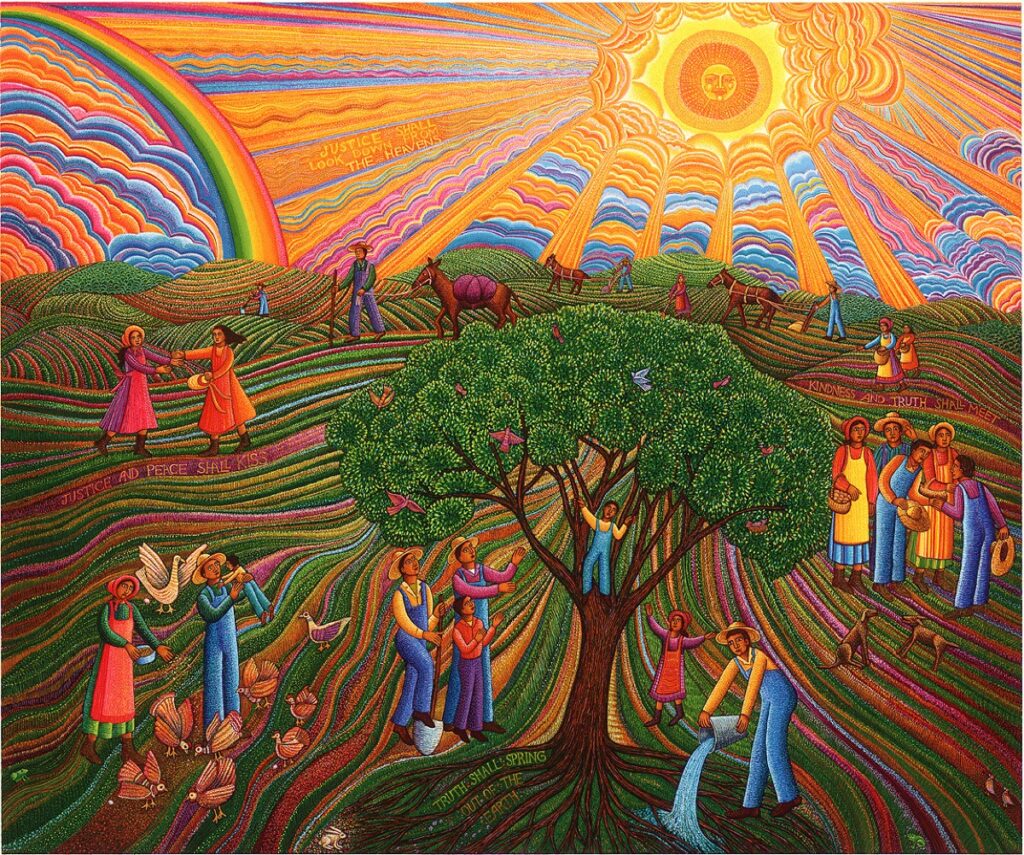
Listen to the podcast version of this post…

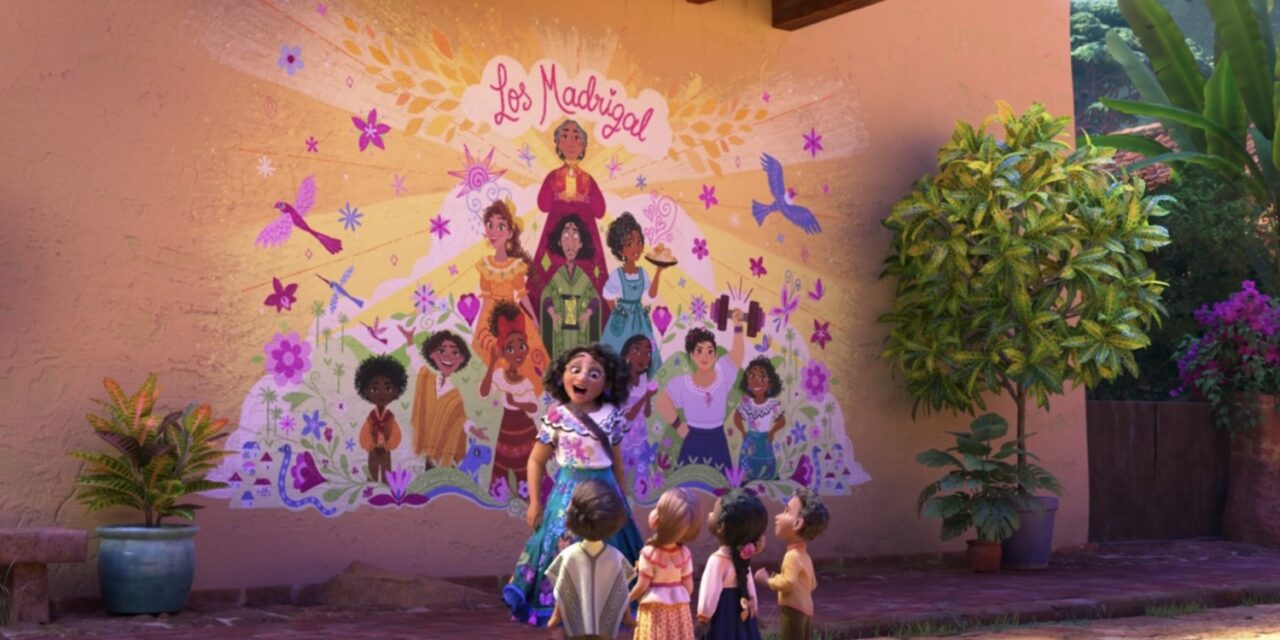
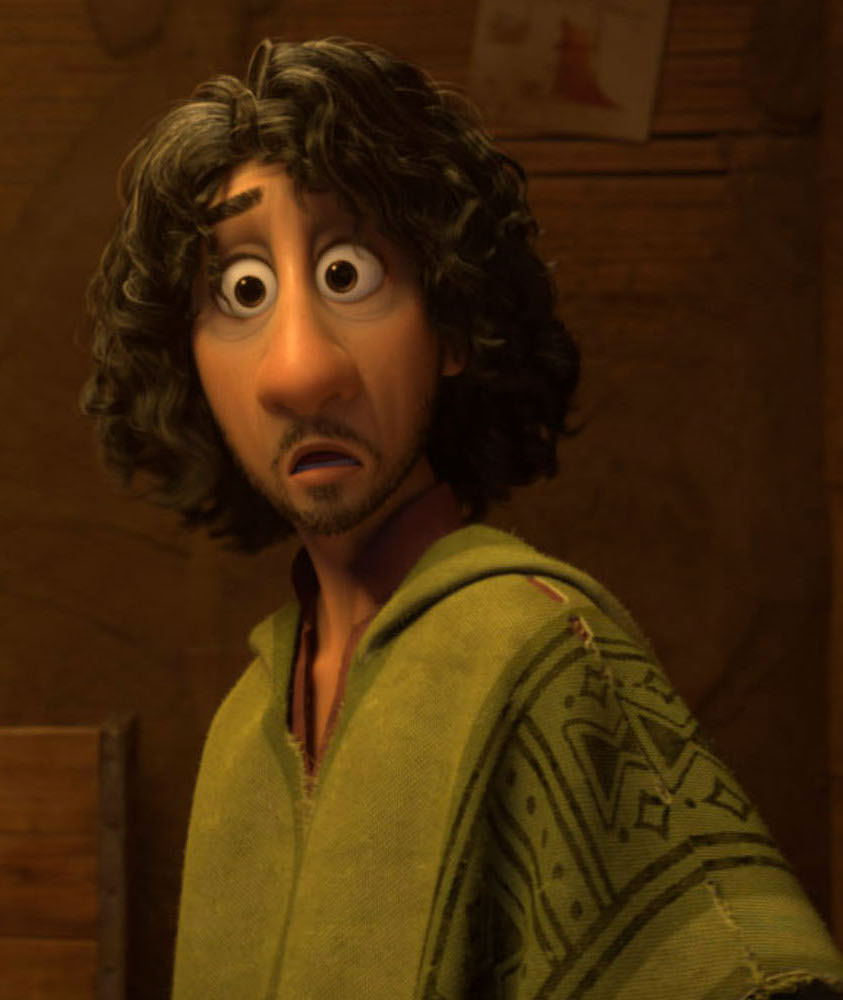 Blindness / Seeing
Blindness / Seeing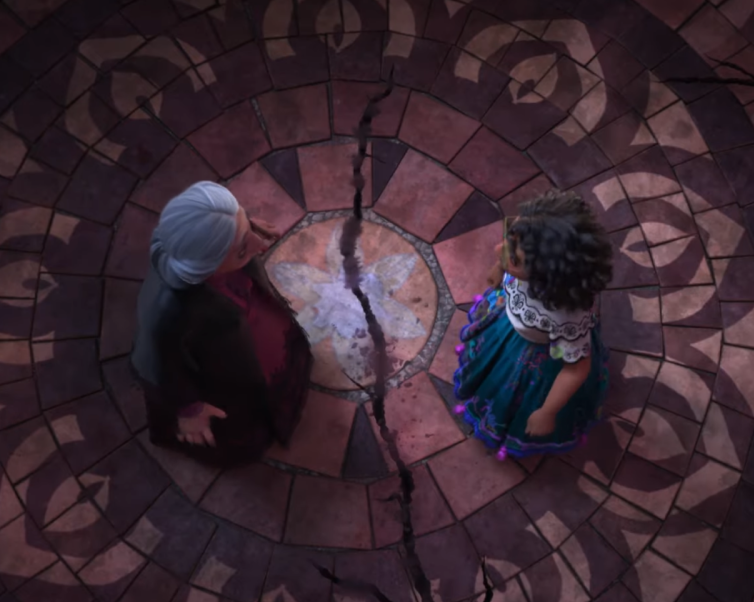 Exclusion / Togetherness
Exclusion / Togetherness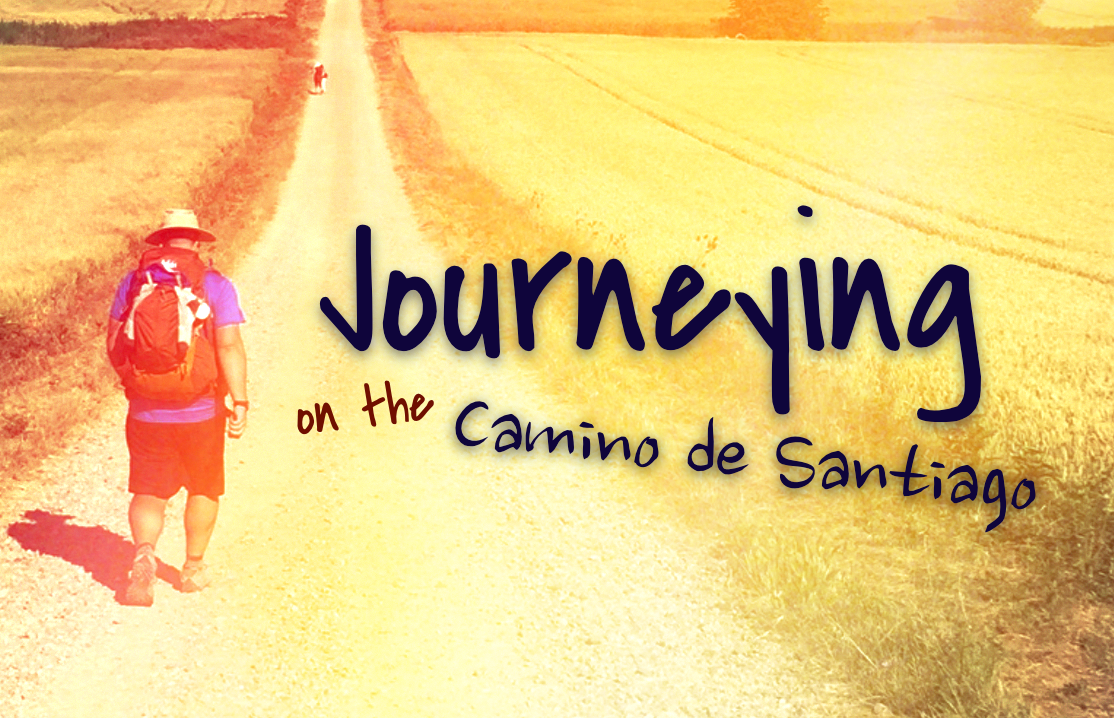
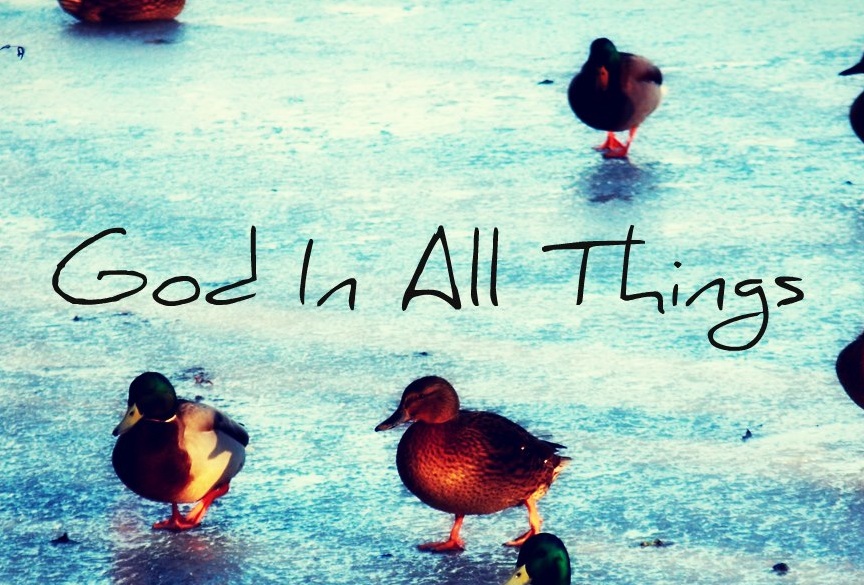
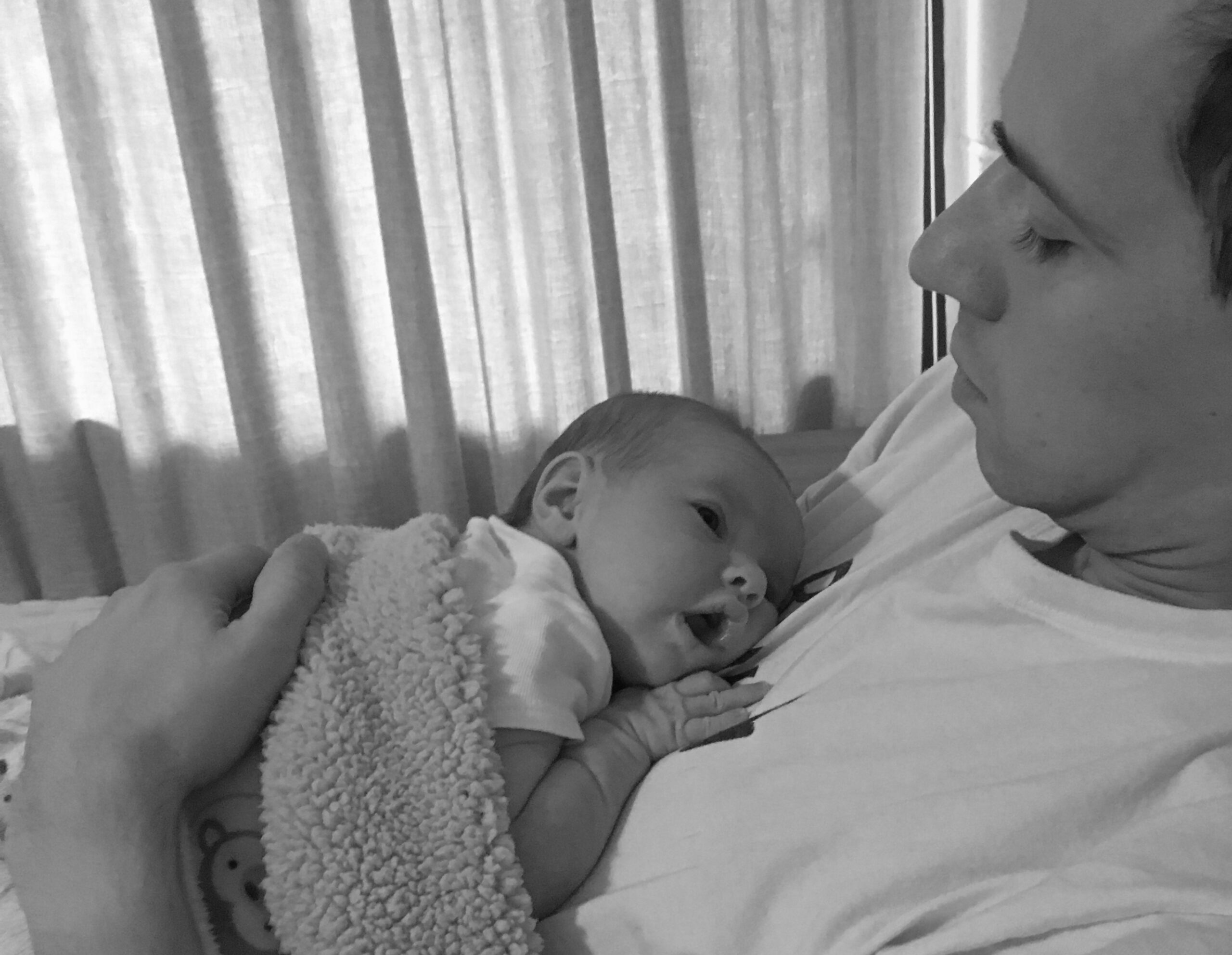




Thanks for an insightful look at this very beautifully done Disney movie. I’m sharing your post with a group of Catholic friends who are working our way through B. McLaren’s book on doubt. We are struggling with doubt and our place in the American Catholic Church. The Death/Resurrection faith especially speaks to me right now. You don’t mention it, but it occurs to me that the conclusion in which the larger community comes into help to restore the family, offering their gifts and talents, is an excellent image of what Pope Francis has in mind for a synodal Church.
This was so beautiful… and I have yet to see the movie! It is now next on my list!
“The stars don’t shine,” Mirabel sings. “They burn. And the constellations shift…”
So delighted that GodInAllThings.com finds a place for Disney movies and their music!
So many themes are going on in this movie. You share them in such a way to honor this newest colorful Disney film. When it comes to Disney movies, many kids (& adults) watch and rewatch and the repetition proves them SO SMART!! it might be good for all of us to have this background to open up those conversations at the dinner table. Happily I’ve shared it with my grown kids and families. Look forward to our next meal, talking about the shifting constellations!! (Such a metaphor for life!) Meanwhile, perhaps a future trip to Disney World includes a new “Miracle Kingdom” haha!